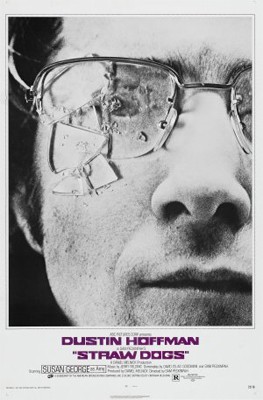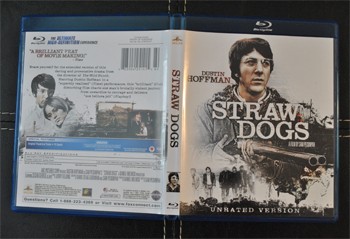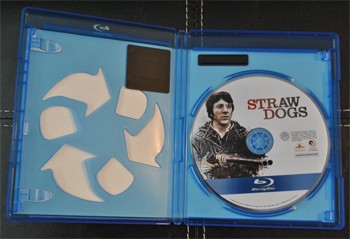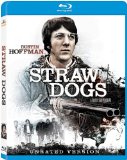| Reviews & Columns |
|
Reviews DVD TV on DVD Blu-ray 4K UHD International DVDs In Theaters Reviews by Studio Video Games Features Collector Series DVDs Easter Egg Database Interviews DVD Talk Radio Feature Articles Columns Anime Talk DVD Savant Horror DVDs The M.O.D. Squad Art House HD Talk Silent DVD
|
DVD Talk Forum |
|
|
| Resources |
|
DVD Price Search Customer Service #'s RCE Info Links |
|
Columns
|
|
|
Straw Dogs (1971)
MGM // Unrated // September 6, 2011
List Price: $24.99 [Buy now and save at Amazon]
The Film:
 Few who have seen Sam Peckinpah's obstinately challenging Straw Dogs can forget the first time they did so. Granted, that's a distinction which falls on many of the director's works, but his subversive portrait of sex-driven power struggles and pent-up desire -- an adaptation of Gordon Williams' novel "The Siege of Trencher's Farm" -- does it in ways unlike his others. Some of it resides in his signature brand of violence, sure, brutally lavish yet keen on the scenes' geography and tolerance level for realism, while some of it comes from the wide-eyed, emotionally candid performances he generates from his leads. Then, there's the message of pacifism and breaking points spiked inside its symbolic posturing, which touches on the rebellious effects that the Vietnam War has on the era's youth. All good reasons, yet they don't compare to one particular hard-to-watch scene of carnal ambiguity, which truly punctuates the film's tenacity. You'll get wrapped up in the violence that ensues, but you won't be able to shake that from your mind.
Few who have seen Sam Peckinpah's obstinately challenging Straw Dogs can forget the first time they did so. Granted, that's a distinction which falls on many of the director's works, but his subversive portrait of sex-driven power struggles and pent-up desire -- an adaptation of Gordon Williams' novel "The Siege of Trencher's Farm" -- does it in ways unlike his others. Some of it resides in his signature brand of violence, sure, brutally lavish yet keen on the scenes' geography and tolerance level for realism, while some of it comes from the wide-eyed, emotionally candid performances he generates from his leads. Then, there's the message of pacifism and breaking points spiked inside its symbolic posturing, which touches on the rebellious effects that the Vietnam War has on the era's youth. All good reasons, yet they don't compare to one particular hard-to-watch scene of carnal ambiguity, which truly punctuates the film's tenacity. You'll get wrapped up in the violence that ensues, but you won't be able to shake that from your mind.
An American astrophysicist, David (Dustin Hoffman), moves with his English wife Amy (Susan George) to her home village in the outskirts of England's moors, mostly so he can conduct his mathematical research away from the protests -- and drafts -- of the Vietnam War. The two seem like a highly unlikely couple; David's a stilted, mild-mannered, knowledge-rooted introvert who's concerned only with his work, while his braless wife flirts and saunters like a flippant teenager around the bucolic cottage they've moved to. And if David's not receptive to her advances, she has a tendency of diverting her attention to those around her. In this case, that includes a cluster of local carpenters working on the cottage's roof, one of which is an old flame of Susan's. As David's uncomfortable not-so-masculine persona begins to wear on the local boys, they begin mildly tormenting him, while also taking his passive nature as a gateway to zero in on Amy. While harmless at first, the tension among them escalates beyond control.
The swell of negative energy in Straw Dogs becomes its paramount driver, which Peckinpah constructs as a steady conflict of strength over gender, sexual energy, and a contorted sense of gruff countryside patriotism. He actively renders every character unlikable in the process, even -- and especially -- the underdog David. Coming off his transitional performance in Midnight Cowboy, Dustin Hoffman brings a controlled energy to the mathematician that hits a credible balance between masculine inferiority and infuriating social awkwardness, which accomplishes the difficult task in making a weak, nerdy man someone whom we won't readily sympathize with. When he's weaving around Amy's bottled-up sexual appetite (while also showing disdain for her cat) and pacifistically handling the scheming construction workers with beer and forced jollity, his poise gives off a seditious energy that's easy to see as a catalyst to the events that transpire. Not a justification, of course, but a comprehendible origin.
Straw Dogs boils at a steady pace -- both cinematically and thematically -- right up to its culmination point: the rape sequence, which earned Pekinpah an X-rating in the US and a full-on ban in England for its lurid context. By today's standards, the amount of skin or sexuality or even abrasiveness might not be enough to taper the film towards such a rating; however, the ambiguous implications stirring in the sequence -- in Amy's motives, her disposition, and her previous teasing actions feeding into this occurrence -- might still be. A mix of her terror and uncomfortable pleasure complicate the scene into a lengthy stretch of intensely-photographed claustrophobia where we're cringing at the varied emotions on her face, at whether the neglected wife actually finds joy and pleasure in being forcibly taken ... and whether it's something she actually wants. It's not an easy scene to watch and reflects heavily on a controversially-skewed viewpoint on rape, which leaves a raw feeling that lingers long after it's done.
Peckinpah's follow-through erupts in a violent cataclysm that only he could properly orchestrate, transforming the last act into a relentless, chilling home invasion scene that racks those already jittery in the audience with intense stylized violence, involving hot oil, nail guns, and bear traps. While it appears to be the emergence of David's hubris and masculinity on the surface, alongside the clear end of his rope, it's also, within the context of one of the film's subplots, a metaphor for the opposition to the Vietnam War, and for the general perception of participating in conflicts which people aren't directly involved in. While watching David shake his head and wield a shotgun at his foes as he interjects in a situation, he's gallantly fighting for a cause that he -- or anyone else, for that matter, aside from the audience -- has little to no clarity on. Straw Dogs is all about perception and the exertion of dominance while surrounded by conflicting factors, and few films are comparable in terms of moral ambiguity.
The Blu-ray:
Video and Audio:
All points considered, Straw Dogs' cinematography appears suitably robust in its dusty-styled palette, presented in a 1080p AVC encode from Fox/MGM that attentively grasps at appropriate detail and contrast balance. It's not without a few issues: the noise within the compression bends more towards digital artificial heaviness instead of natural film-stock presence, the overall hazy detail could likely be tightened and refined, and a few blips/scratches pop up. Still, plenty of respectful, natural positives can be found in the presentation; you'll find yourself surprised at the presence of textures in clothing and in exterior shots, from David's woven sweaters and etchings in lampshades to the vines in a tree and the threads in a rope, while the presence of appropriately-saturated skin tones sits well against the cinematography's overall tan-leaning appearance. Moreover, Pekinpah plays a bit with some subtle usage of depth-of-field, which gives the disc a few moments to shine in terms of three-dimensional appearance. It's a strong-looking disc that could perhaps use a bit more refinement, but should satisfy aficionados of the film.
The 5-channel DTS-HD Master Audio track isn't as satisfying, really, sounding thin and lacking punch even for a '70s film. Vocal delivery often settles a bit high and tight for its own good, wearing the sound design's vintage on its sleeve, while firmer sound effects later in the film aren't as vigorous as they likely could be. Aside from that, and looking at it as a whole, there are several things that the aural track gets very right: silence in the film renders little to no hiss or noise until a thud or subtle effect can clearly be heard, the dialogue still remains audible and clear, and you'll have a few instances where slight sound effects will enhance immersion -- the chirping of birds, sounds of a town, etc. It's not a bad track, but more could likely be done to bolster its energetic presence.
Special Features:
Unlike the two-disc treatment from The Criterion Collection that contains an audio commentary, a documentary on Sam Peckinpah, and other behind-the-scenes content, all we've got here are a series of three TV Spots (SD AVC) and a Theatrical Trailer (1:42, SD AVC).
Final Thoughts:
It's no accident that Sam Peckinpah's Straw Dogs -- a challenging, intense piece of work centering on gender dominance, sexual presence, and the hard-hitting terrifying elements accompanying home invasion -- was released now on Blu-ray: an updated remake has hit theaters, which (if Jason Bailey's theatrical review and others are correct) attempts to "clarify" many of the conflicting elements in the picture. While I've yet to see it, I'd suggest you pony up the money for MGM's decent, bare-boned presentation of the original film above venturing to the theaters. You'll get the lurid violence and the subversive content alongside a complex performance from Dustin Hoffman, as well as a vein of complexity and figurative symbolism that fits Peckinpah's lavish filmmaking perspective like a glove. Recommended, though I wouldn't be surprised if a fuller edition (perhaps from The Criterion Collection) were to arrive some time in the near future.
Thomas Spurlin, Staff Reviewer -- DVDTalk Reviews | Personal Blog/Site
 Few who have seen Sam Peckinpah's obstinately challenging Straw Dogs can forget the first time they did so. Granted, that's a distinction which falls on many of the director's works, but his subversive portrait of sex-driven power struggles and pent-up desire -- an adaptation of Gordon Williams' novel "The Siege of Trencher's Farm" -- does it in ways unlike his others. Some of it resides in his signature brand of violence, sure, brutally lavish yet keen on the scenes' geography and tolerance level for realism, while some of it comes from the wide-eyed, emotionally candid performances he generates from his leads. Then, there's the message of pacifism and breaking points spiked inside its symbolic posturing, which touches on the rebellious effects that the Vietnam War has on the era's youth. All good reasons, yet they don't compare to one particular hard-to-watch scene of carnal ambiguity, which truly punctuates the film's tenacity. You'll get wrapped up in the violence that ensues, but you won't be able to shake that from your mind.
Few who have seen Sam Peckinpah's obstinately challenging Straw Dogs can forget the first time they did so. Granted, that's a distinction which falls on many of the director's works, but his subversive portrait of sex-driven power struggles and pent-up desire -- an adaptation of Gordon Williams' novel "The Siege of Trencher's Farm" -- does it in ways unlike his others. Some of it resides in his signature brand of violence, sure, brutally lavish yet keen on the scenes' geography and tolerance level for realism, while some of it comes from the wide-eyed, emotionally candid performances he generates from his leads. Then, there's the message of pacifism and breaking points spiked inside its symbolic posturing, which touches on the rebellious effects that the Vietnam War has on the era's youth. All good reasons, yet they don't compare to one particular hard-to-watch scene of carnal ambiguity, which truly punctuates the film's tenacity. You'll get wrapped up in the violence that ensues, but you won't be able to shake that from your mind. An American astrophysicist, David (Dustin Hoffman), moves with his English wife Amy (Susan George) to her home village in the outskirts of England's moors, mostly so he can conduct his mathematical research away from the protests -- and drafts -- of the Vietnam War. The two seem like a highly unlikely couple; David's a stilted, mild-mannered, knowledge-rooted introvert who's concerned only with his work, while his braless wife flirts and saunters like a flippant teenager around the bucolic cottage they've moved to. And if David's not receptive to her advances, she has a tendency of diverting her attention to those around her. In this case, that includes a cluster of local carpenters working on the cottage's roof, one of which is an old flame of Susan's. As David's uncomfortable not-so-masculine persona begins to wear on the local boys, they begin mildly tormenting him, while also taking his passive nature as a gateway to zero in on Amy. While harmless at first, the tension among them escalates beyond control.
The swell of negative energy in Straw Dogs becomes its paramount driver, which Peckinpah constructs as a steady conflict of strength over gender, sexual energy, and a contorted sense of gruff countryside patriotism. He actively renders every character unlikable in the process, even -- and especially -- the underdog David. Coming off his transitional performance in Midnight Cowboy, Dustin Hoffman brings a controlled energy to the mathematician that hits a credible balance between masculine inferiority and infuriating social awkwardness, which accomplishes the difficult task in making a weak, nerdy man someone whom we won't readily sympathize with. When he's weaving around Amy's bottled-up sexual appetite (while also showing disdain for her cat) and pacifistically handling the scheming construction workers with beer and forced jollity, his poise gives off a seditious energy that's easy to see as a catalyst to the events that transpire. Not a justification, of course, but a comprehendible origin.
Straw Dogs boils at a steady pace -- both cinematically and thematically -- right up to its culmination point: the rape sequence, which earned Pekinpah an X-rating in the US and a full-on ban in England for its lurid context. By today's standards, the amount of skin or sexuality or even abrasiveness might not be enough to taper the film towards such a rating; however, the ambiguous implications stirring in the sequence -- in Amy's motives, her disposition, and her previous teasing actions feeding into this occurrence -- might still be. A mix of her terror and uncomfortable pleasure complicate the scene into a lengthy stretch of intensely-photographed claustrophobia where we're cringing at the varied emotions on her face, at whether the neglected wife actually finds joy and pleasure in being forcibly taken ... and whether it's something she actually wants. It's not an easy scene to watch and reflects heavily on a controversially-skewed viewpoint on rape, which leaves a raw feeling that lingers long after it's done.
Peckinpah's follow-through erupts in a violent cataclysm that only he could properly orchestrate, transforming the last act into a relentless, chilling home invasion scene that racks those already jittery in the audience with intense stylized violence, involving hot oil, nail guns, and bear traps. While it appears to be the emergence of David's hubris and masculinity on the surface, alongside the clear end of his rope, it's also, within the context of one of the film's subplots, a metaphor for the opposition to the Vietnam War, and for the general perception of participating in conflicts which people aren't directly involved in. While watching David shake his head and wield a shotgun at his foes as he interjects in a situation, he's gallantly fighting for a cause that he -- or anyone else, for that matter, aside from the audience -- has little to no clarity on. Straw Dogs is all about perception and the exertion of dominance while surrounded by conflicting factors, and few films are comparable in terms of moral ambiguity.
The Blu-ray:
 |  |
Video and Audio:
All points considered, Straw Dogs' cinematography appears suitably robust in its dusty-styled palette, presented in a 1080p AVC encode from Fox/MGM that attentively grasps at appropriate detail and contrast balance. It's not without a few issues: the noise within the compression bends more towards digital artificial heaviness instead of natural film-stock presence, the overall hazy detail could likely be tightened and refined, and a few blips/scratches pop up. Still, plenty of respectful, natural positives can be found in the presentation; you'll find yourself surprised at the presence of textures in clothing and in exterior shots, from David's woven sweaters and etchings in lampshades to the vines in a tree and the threads in a rope, while the presence of appropriately-saturated skin tones sits well against the cinematography's overall tan-leaning appearance. Moreover, Pekinpah plays a bit with some subtle usage of depth-of-field, which gives the disc a few moments to shine in terms of three-dimensional appearance. It's a strong-looking disc that could perhaps use a bit more refinement, but should satisfy aficionados of the film.
The 5-channel DTS-HD Master Audio track isn't as satisfying, really, sounding thin and lacking punch even for a '70s film. Vocal delivery often settles a bit high and tight for its own good, wearing the sound design's vintage on its sleeve, while firmer sound effects later in the film aren't as vigorous as they likely could be. Aside from that, and looking at it as a whole, there are several things that the aural track gets very right: silence in the film renders little to no hiss or noise until a thud or subtle effect can clearly be heard, the dialogue still remains audible and clear, and you'll have a few instances where slight sound effects will enhance immersion -- the chirping of birds, sounds of a town, etc. It's not a bad track, but more could likely be done to bolster its energetic presence.
Special Features:
Unlike the two-disc treatment from The Criterion Collection that contains an audio commentary, a documentary on Sam Peckinpah, and other behind-the-scenes content, all we've got here are a series of three TV Spots (SD AVC) and a Theatrical Trailer (1:42, SD AVC).
Final Thoughts:
It's no accident that Sam Peckinpah's Straw Dogs -- a challenging, intense piece of work centering on gender dominance, sexual presence, and the hard-hitting terrifying elements accompanying home invasion -- was released now on Blu-ray: an updated remake has hit theaters, which (if Jason Bailey's theatrical review and others are correct) attempts to "clarify" many of the conflicting elements in the picture. While I've yet to see it, I'd suggest you pony up the money for MGM's decent, bare-boned presentation of the original film above venturing to the theaters. You'll get the lurid violence and the subversive content alongside a complex performance from Dustin Hoffman, as well as a vein of complexity and figurative symbolism that fits Peckinpah's lavish filmmaking perspective like a glove. Recommended, though I wouldn't be surprised if a fuller edition (perhaps from The Criterion Collection) were to arrive some time in the near future.
|
| Popular Reviews |
| Sponsored Links |
|
|
| Sponsored Links |
|
|
| Release List | Reviews | Shop | Newsletter | Forum | DVD Giveaways | Blu-Ray | Advertise |
|
Copyright 2024 DVDTalk.com All Rights Reserved. Legal Info, Privacy Policy, Terms of Use,
Manage Preferences,
Your Privacy Choices | |||||||













